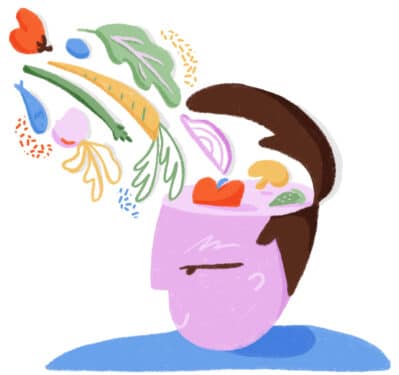The foods we choose matter, shaping our health from head to toe
Fact checked by Jim Lacy
Illustrations by Fiorella Quaranta
What we eat is far more than fuel. Nutrition weaves through every system in our body, influencing not only how we feel day to day but also our long-term risk of chronic disease. From protecting the brain and heart to strengthening bones, joints, and muscles — and even lowering cancer risk — dietary choices leave a lasting impact.
Feeding the brain
The connection between diet and brain health has become a hot area of research, and locally in Chicago, researchers are making a big impact.
Scientists at Rush University Medical Center developed the MIND diet (Mediterranean-DASH Intervention for Neurodegenerative Delay) by blending principles of the Mediterranean and DASH diets.
Martha Clare Morris, ScD, and Christy Tangney, PhD, introduced the diet in 2015 after two decades of research.

“The MIND diet has been associated with slower cognitive decline, reduced risk of Alzheimer’s disease, delayed onset and milder symptoms in Parkinson’s, and reduced inflammation and oxidative stress, which are common threads across multiple neurological conditions,” says Jennifer Ventrelle, a registered dietitian nutritionist and assistant professor at Rush.
Beyond brain cells, these foods also nourish the gut microbiome, which scientists now recognize as a critical partner in mental and physical health. Researchers note that what we eat directly impacts brain function, structure, and even mood.
“You don’t have to be perfect in order to make a difference in your brain health,” Ventrelle says. “You don’t have to completely give up the foods that are a part of your culture or bring you joy.”
Good gut health
For two-thirds of Americans living with digestive issues, nutrition can be a confounding topic. Kristin Gustashaw, a clinical dietitian at Rush, urges patients not to jump on fad diets or self-restrict without guidance.
“I highly recommend against it,” she says. “People really just over-restrict their diets and then aren’t realizing all the potential nutrients that they’re avoiding unintentionally.”

According to Gustashaw, supplements aren’t always necessary. “We forget that our food actually carries these properties. If you’re eating well, your foods can really be much more of a one-stop shop.”
Protecting the heart
A balanced diet doesn’t just protect the brain and gut — it also keeps the heart strong. Research shows people who adhere closely to healthy eating patterns have up to a 21% lower risk of cardiovascular disease.
“Electrolytes like potassium, sodium, calcium, and magnesium are essential for the electrical signals that regulate heart rhythm,” says Mark Rabbat, MD, a cardiologist at Loyola University Medical Center.
Diets heavy in alcohol, caffeine, salt, sugar, saturated fats, and ultra-processed foods can trigger inflammation and arrhythmias such as atrial fibrillation. Obesity also increases risks.
“Maintaining a healthy weight through a balanced diet and regular exercise is crucial,” Rabbat says.
Plant-based foods, lean proteins, whole grains, and healthy fats support heart function, blood vessel health, and long-term cardiovascular resilience.
Building strength
Nutrition also determines how strong, mobile, and resilient our musculoskeletal system is.
“Everything that we eat provides the essential nutrients to support and maintain these tissues,” says Vishal Mehta, MD, orthopedic specialist and president of Fox Valley Orthopedics in Geneva.
Calcium and vitamin D are essential for strong bones, while adequate protein helps build muscle tissue. Electrolytes, such as potassium, help prevent cramps, and proper hydration is essential for maintaining joint lubrication.
Emerging research also links anti-inflammatory diets with reduced joint pain. Foods high in fiber, probiotics, omega-3 fatty acids, turmeric, and antioxidants may reduce inflammation and support recovery.
“You can’t go wrong by simply maintaining a well-balanced diet that has plenty of protein, and being aggressive with hydration and rehydration after activities,” Mehta says. He also cautions against smoking and excessive alcohol, which counteract nutrition’s benefits.
Cancer and nutrition
Cancer remains one of the most-feared diagnoses, with more than two million new cases projected in the United States in 2025, according to the National Cancer Institute. No diet can prevent cancer outright, but experts say nutrition plays a powerful role in reducing risk.
“Healthy eating can support healthy body weight, improve immune function, and increase energy levels — all of which contribute to lowering cancer risk,” says Maria Vargas Guzman, an advanced clinical dietitian at Northwestern Memorial Hospital.

Researchers have strongly linked processed red meats, such as bacon, sausage, and hot dogs, to colorectal cancer. Vargas says processed meats “often contain nitrates or are smoked or cured, which can produce harmful compounds in the body.” Limit your consumption, and balance it with a diet rich in plant-based foods.
Alcohol, too, increases cancer risk in a dose-dependent way. “The more you drink, the higher the risk,” she says. “Cutting back matters, even if it’s just a glass or two fewer per week.”
Excess body fat is another major risk factor associated with at least 12 types of cancer. Regular physical activity, especially strength training, further reduces risk and supports overall health.
“That said, healthy weight looks different for everyone and can vary depending on individual factors such as age, height, and gender,” Vargas says. “This isn’t about cutting out these foods forever, but the key is moderation.”
Foundational foods
From brain health to gut function, heart rhythm to bone strength, and even cancer prevention, food is a powerful form of medicine. Whole, nutrient-rich, plant-forward meals paired with moderation — not perfection — form the foundation for lifelong health.
As Ventrelle puts it: You don’t have to be perfect. You need to make consistent, nourishing choices that work for you.














